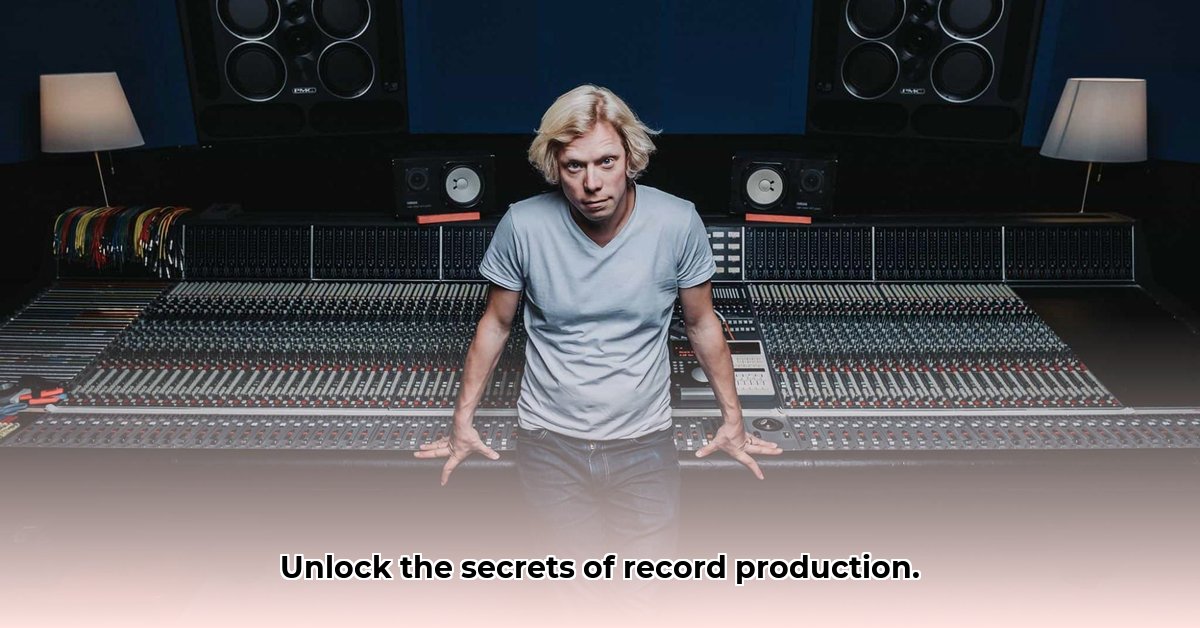
Thinking of becoming a record producer? It's a multifaceted career demanding a blend of artistic vision, technical expertise, and business acumen. This comprehensive guide breaks down the core responsibilities, essential skills, and pathways to success, equipping you with the knowledge and strategies to navigate the dynamic music industry. Whether you aspire to specialize in a niche genre or lead a major label, this guide provides a practical roadmap for your journey. For a more concise overview, check out this helpful article on what is a record producer.
Record Producer Roles and Responsibilities: The Multifaceted Role
A record producer acts as the central orchestrator, guiding a project from its conceptualization to its final release. This involves significantly more than just technical proficiency; it's about creative leadership, meticulous project management, and astute business sense. Let's examine the key areas of responsibility:
Core Responsibilities: Wearing Many Hats
Creative Direction: You're the artistic compass, collaborating closely with artists to shape the sonic landscape of their music. This includes everything from instrument selection and vocal guidance to ensuring the final product aligns with the artist's vision while remaining commercially viable. Think of yourself as a musical consultant, helping artists refine their ideas and translate their creative vision into compelling music.
Technical Production: This is where your technical skills shine. Proficiency in Digital Audio Workstations (DAWs) – such as Pro Tools, Ableton Live, or Logic Pro – is essential. You oversee recording sessions, manage editing, mixing, and mastering, ensuring the highest technical standards are met. A robust understanding of audio engineering principles (EQ, compression, etc.), microphone techniques, and outboard gear is crucial for achieving a polished, professional sound. This also necessitates troubleshooting technical problems.
Project Management: Producing a record is a complex logistical undertaking. You are responsible for managing budgets, schedules, and personnel—coordinating studio time, musicians, engineers, and other professionals. This requires efficient workflows, anticipating potential roadblocks, and proactive planning to keep the project on track and within budget.
Business Acumen: The music industry is a business. You’ll negotiate contracts, manage royalties, and understand the financial intricacies of music production. Building strong relationships with labels, publishers, and other industry players is crucial. This also includes a solid understanding of copyright law, licensing agreements, and other legal aspects of the industry. Isn't it fascinating how the creative and the business world intertwine in this profession?
Essential Skills: Building Your Producer Toolkit
To succeed, you need a versatile skillset encompassing technical proficiency, creative acumen, and business savvy:
1. Technical Prowess: Mastering the Tools
Proficiency in a DAW is fundamental. Beyond software, a deep understanding of audio engineering principles (EQ, compression, reverb, etc.) and hands-on experience with microphones and recording equipment are equally vital. This requires both theoretical knowledge and extensive practical application. What DAW are you currently mastering and what resources are you using to enhance your skills?
2. Creative Acumen: Shaping the Sound
A keen musical ear, arranging and compositional skills are essential. You must effectively interpret and translate an artist's vision, guide them in exploring musical ideas, and ultimately help them create compelling music. This requires exceptional communication skills, as you'll be collaborating with diverse creative personalities.
3. Business Savvy: Navigating the Industry
Understanding budgeting, contract negotiation, and royalty structures is critical. You'll be handling project finances and negotiating deals with labels and other stakeholders. How will you ensure your contracts protect both your interests and those of your artists?
Navigating the Industry: Challenges and Solutions
The path of a record producer is rarely linear. Here are common challenges and effective strategies for navigating them:
Collaboration: The Art of Teamwork
Working with artists and engineers requires navigating diverse personalities and creative styles. Effective communication, flexibility, and a collaborative spirit are key to resolving conflicts and fostering a positive environment. How do you plan to build strong, collaborative relationships with artists?
Technical Glitches: Expecting the Unexpected
Equipment malfunctions and software issues are inevitable. Proactive troubleshooting skills and a problem-solving mindset are crucial for minimizing downtime and maintaining project momentum. What are your strategies for dealing with unexpected technical issues during a recording session?
Budgetary Constraints: Balancing Quality and Cost
Balancing quality with budget limitations is a constant challenge. Careful planning, efficient resource management, and cost-effective solutions are crucial.
Creative Differences: Finding Common Ground
Disagreements on artistic direction are common. Open communication, compromise, and a willingness to listen to different perspectives are essential for finding mutually acceptable solutions. How do you approach situations where artistic visions differ significantly between yourself and the artist?
Career Paths: Charting Your Course
The music production field offers diverse career paths:
Genre Specialization: Focus on a particular genre to establish yourself as an expert.
Entrepreneurship: Starting your own production company or label offers more control but demands strong business skills and risk management.
Executive Roles: With experience, you could transition into A&R roles or label management.
Legal & Ethical Considerations: Protecting Your Work
Understanding copyright law, intellectual property rights, and artist contracts is paramount. Clear communication and transparent agreements are key to building positive and professional relationships.
Actionable Steps: Your Roadmap to Success
- Master Your Craft: Develop proficiency in a DAW, learn audio engineering, hone your musical skills, and continuously practice.
- Network Strategically: Attend industry events, connect with artists and other producers, and build professional relationships.
- Build Your Portfolio: Showcase your best work to potential clients. A strong online portfolio is a powerful tool.
- Market Yourself: Create a professional online presence to showcase your talents and increase visibility.
- Develop a Business Plan: A solid plan will provide direction, help manage finances, and ensure long-term success.
The music industry is competitive, but with dedication and passion, you can achieve your goals. Remember, the industry is constantly evolving, so continuous learning and adaptation are essential for long-term success.